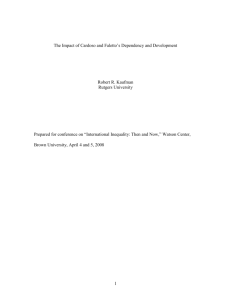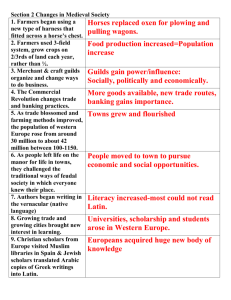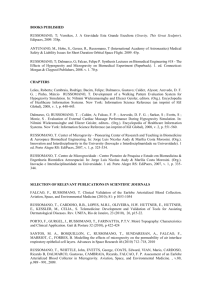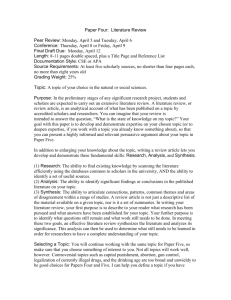Remember Everything I wrote: The Impact of Fernando
advertisement
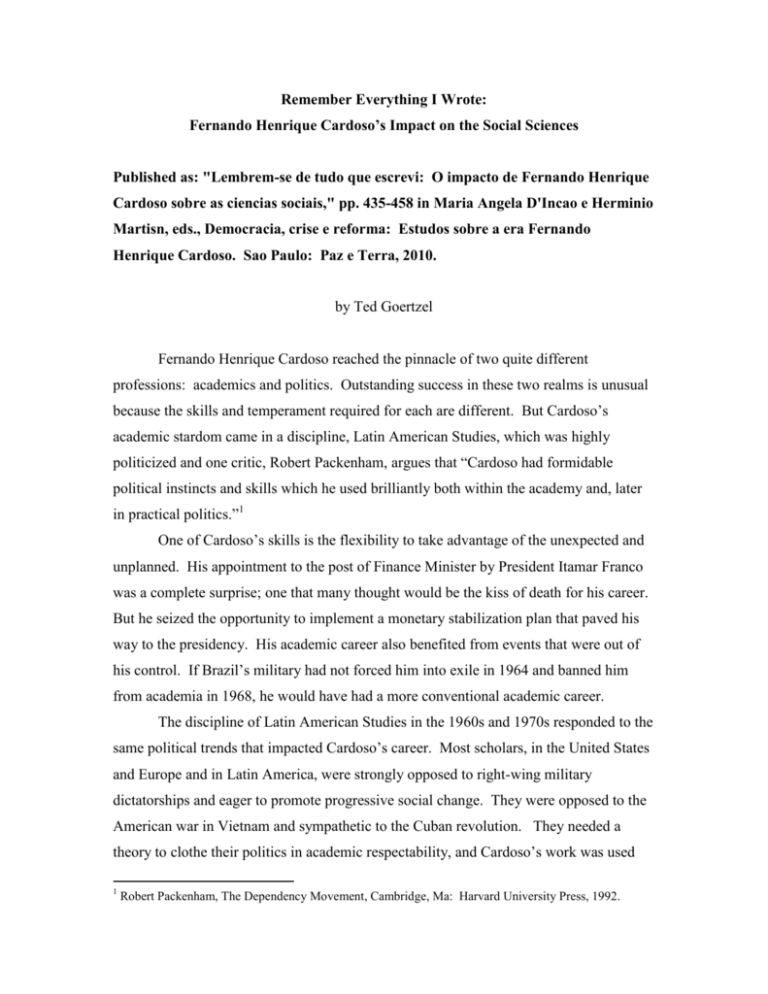
Remember Everything I Wrote: Fernando Henrique Cardoso’s Impact on the Social Sciences Published as: "Lembrem-se de tudo que escrevi: O impacto de Fernando Henrique Cardoso sobre as ciencias sociais," pp. 435-458 in Maria Angela D'Incao e Herminio Martisn, eds., Democracia, crise e reforma: Estudos sobre a era Fernando Henrique Cardoso. Sao Paulo: Paz e Terra, 2010. by Ted Goertzel Fernando Henrique Cardoso reached the pinnacle of two quite different professions: academics and politics. Outstanding success in these two realms is unusual because the skills and temperament required for each are different. But Cardoso’s academic stardom came in a discipline, Latin American Studies, which was highly politicized and one critic, Robert Packenham, argues that “Cardoso had formidable political instincts and skills which he used brilliantly both within the academy and, later in practical politics.”1 One of Cardoso’s skills is the flexibility to take advantage of the unexpected and unplanned. His appointment to the post of Finance Minister by President Itamar Franco was a complete surprise; one that many thought would be the kiss of death for his career. But he seized the opportunity to implement a monetary stabilization plan that paved his way to the presidency. His academic career also benefited from events that were out of his control. If Brazil’s military had not forced him into exile in 1964 and banned him from academia in 1968, he would have had a more conventional academic career. The discipline of Latin American Studies in the 1960s and 1970s responded to the same political trends that impacted Cardoso’s career. Most scholars, in the United States and Europe and in Latin America, were strongly opposed to right-wing military dictatorships and eager to promote progressive social change. They were opposed to the American war in Vietnam and sympathetic to the Cuban revolution. They needed a theory to clothe their politics in academic respectability, and Cardoso’s work was used 1 Robert Packenham, The Dependency Movement, Cambridge, Ma: Harvard University Press, 1992. for this purpose, even though it sometimes meant a selective and even distorted reading of his scholarship. Academic stardom can be measured by counting citations, the number of times that one scholar cites the work of another in a scholarly publication. Citations may not measure the true quality of a work, but they do reflect its impact in the scholarly community. The power of this measurement tool has been greatly enhanced by the development of Google Scholar, a specialized search engine that scans scholarly works in all countries and languages, in obscure publications as well as prestigious ones. This is not the better known Google internet search engine that indexes the World Wide Web; Google scholar is limited to scholarly papers and publications. The well funded minions of Google scan every book and scholarly journal ever published anywhere in any language. In addition to counting the citations, Google Scholar provides a link to each source, facilitating access to the original texts. One book stands out in a Google Scholar search for works by Fernando Henrique Cardoso: Dependency and Development in Latin America, co-authored with Enzo Faletto. This book has 1116 citations to its various editions in different languages. This is not the peak of citation stardom, but it is close. Talcott Parsons’ The Social System has been cited 4295 times. In the field of third-world studies, Cardoso and Faletto are outranked by Frantz Fanon’s The Wretched of the Earth, with 2606 citations. But it is probably the highest ranked book in Latin American studies, beating Andre Gunder Frank’s Capitalism and Underdevelopment in Latin America, with 991 citations, and Raul Prebisch’s The Economic Development of Latin America with 727. Table One2 Scholarly Citations of Key Works by Fernando Henrique Cardoso 1960 1962 1965 1969 1970 1971 1976 1978 1979 1969 1972 1973 1973 1975 1975 1977 1977 1977 1978 1979 1980 1994 1994 1998 1998 2001 2001 2006 2006 Côr e Mobilidade Social em Florianópolis Capitalismo e Escravidão no Brasil Meridional Empresario Industrial e Desenvolvimento Economico Dependencia y Desarollo in America Latina Dependência e Desenvolvimento na América Latina Dipendenza e Sviluppo in America latina Abhängigkeit und Entwicklung in Lateinamerika Dépendance et Développement en Amérique latine Dependency and Development in Latin America All editions of Dependencia y Desarollo Mudanças Sociais na América Latina Estado y Sociedad en America Latina O Modelo Politico Brasileiro e Outros Ensaios Associated-Dependent Development Autoritarismo e Democratização Os partidos e as eleições no Brasil The Consumption of Dependency Theory in the United States El Consumo de la Teoría de la Dependencia en los Estados Unidos Amazônia: Expansão do Capitalismo On the Characterisation of Authoritarian Regimes in Latin America New Authoritarianism in Latin America As Idéias e Seu Lugar A Construção da Democracia Mãos à Obra, Brasil: Proposta de Governo O Presidente Segundo o Sociologo Reforma do Estado Democracy as a Starting Point Charting a New Course A Arte da Politica The Accidental President of Brazil 37 109 78 258 168 5 29 26 630 1116 25 24 71 69 80 21 66 12 29 40 192 49 14 56 29 22 19 15 8 6 Cardoso’s scholarly record is not limited to one book. He published a number of well received scholarly works during the 1970s and 1980s, some co-authored with other scholars. These were read and cited by other specialists working in the same areas. His academic stardom, however, depended on a book that was first published in Spanish in 1969. The number of citations this book received is especially remarkable because scholarly publishing is dominated by works published in English. About half of the citations to Desarollo y Desenvolvimento en América Latina are from works published in 2 Figures from a search of Google Scholar (scholar.google.com) on March 19, 2008. This includes only the most cited works, there are also many citations of other works. English. The 1979 English language edition was considerably revised and enlarged from the first edition, so in some ways it can be considered a different book. Why was this book so successful? It was not a magnum opus presenting a new general theory. The authors called it an essay. It surveyed and contrasted the economic histories of Brazil, Argentina, Mexico, Bolivia, Colombia, Venezuela, Chile, Uruguay, Guatemala and Chile in 220 pages, a treatment which was necessarily highly selective. It found great variety in the ways the elites in each country managed their relationships with external economic interests. If there is a single message in the book, it is that Latin American countries were not passive victims of global forces, but active players whose choices of development strategies were critical to their success or failure. Very few of the scholarly works citing Dependency and Development include a detailed discussion of its arguments, let alone an analysis of the case study materials. Most Latin Americanists are really expert on only one country, or perhaps a region such as Central America. Cardoso, like most Brazilian scholars, focused mostly on Brazil until he was forced into exile in 1964. His job with the United Nations in Santiago de Chile brought him into daily contact with outstanding scholars from all over Latin America and made him into a true Latin Americanist. Many of the English speaking authors who cite Desarollo y Desenvolvimento en América Latina list it as one of several works in a body of work they call “dependency theory.” Dependency theory is often said to postulate that the poverty of the third world is fundamentally caused by exploitation by the wealthy countries. This fits the work of Andre Gunder Frank quite well, but it misses Cardoso and Faletto’s argument that development is possible within the framework of what is now called globalization. Many authors seem to have read Gunder Frank enthusiastically but given only cursory attention to Cardoso and Faletto, then lumped the two together. One of the appeals of “dependency theory” for English speaking academics was that it was a Latin American product, the first major social science theory to come from a third world country. Gunder Frank was German born and American educated, he could not be cited as the “discoverer” of dependency. But, as Robert Packenham observed in his study of The Dependency Movement, Cardoso was perfect for the role of founder of dependency theory. He was Brazilian, a leftist proud of his Marxist studies, and a distinguished social scientist with solid scholarly accomplishments to his credit. In addition, he was a cultivated, gracious, multilingual man who went out of his way to be helpful to scholars working in the field even when they differed with him ideologically, especially when they were in trouble with a military regime. He was a perfect icon for the “dependency movement” and was required reading in graduate seminars around the world. Dependency and Development is a complex, subtle and nuanced book. It raises a great many important questions, and suggests possible answers, but it does not offer simple hypotheses that can easily be proved right or wrong with objective data. In this sense, it has something in common with a political platform, which offers something for everyone. Rather than attacking other scholars, Cardoso generally tried to find value in their work and to gently nudge them in directions he thought more productive. If these were “political skills” they were ones that came naturally to him. Cardoso’s family has long been part of Brazil’s political elite, and he learned civilized political discourse around the family dinner table. The problem with this is that Cardoso was praised and cited more often than he was imitated. He thought scholars should focus on intensive studies of the histories and current conditions and future options in each country. There were certainly scholars who did this kind of important work, including Peter Evans whose Dependent Development: The Alliance of Multinational, State and Local Capital in Brazil was an outstanding example of the kind of work Cardoso hoped to encourage. And it was well received, with 558 Google Scholar citations. But the massive response to Dependency and Development went well beyond this kind of work by country specialists. Some of it came from scholars with a strong ideological commitment to defending the third world from imperialist exploitation. And some of it came from scholars looking for falsifiable hypotheses they could test with quantitative data. Both of these groups thought in terms of polar opposites: “modernization vs. dependency” or “socialism vs. barbarism.” They set out to prove that one side was right and the other wrong. This was never Cardoso’s approach. He refused to formalize his ideas and submit them to quantitative tests. He insisted that dependency was not a “theory” to be tested, but a problem to be studied. He made these arguments quite forcefully in an address to the Latin American Studies Association in Atlanta, Georgia, in 1976. He told the Latin Americanists that if their meeting had been observed by a creature from outer space, he would have thought that “the brains of these beings appear to limit their images and thoughts to binary opposites.”3 This talk was published as a paper called “The Consumption of Dependency Theory in the United States,” which had considerable influence on Latin Americanists. Google Scholar lists 66 citations to the English version and 12 to the Spanish. This was partly a political issue; “dependency theory” was used as euphemism for the Leninist theory of imperialism by academic activists whose main goal was to promote socialist revolution. But there was also a fundamental issue of the philosophy of science. Many of Cardoso’s critics were adherents of Karl Popper’s argument that scientific progress is made by advancing testable hypotheses and then seeing if they can be falsified by empirical research. In the 1970s, Popper’s ideas were very widely accepted by social scientists who hoped that the social sciences could become quantitative disciplines like physics and chemistry. Cardoso firmly rejected this approach. He did not believe that social science “theories” were abstract truths that could be usefully summarized in formal propositions and then tested with any available quantitative data set. They were statements about specific historical conjunctures, the truth of which would become more apparent as those conjunctures developed. Cardoso’s work was rooted in a Marxist and Hegelian tradition which stressed the gradual development of a more complete understanding through debate and refinement of ideas. Empirical data is part of this process, but it is used to refine and develop theories, not to discard them when they fail a statistical test. Today, the limitations of Popper’s ideas are better understood. His ideas apply best to fields where experiments are expensive and time consuming, so few are done and they are likely to be critical. In these fields, a hypothesis is formed based on theory and past observations and then tested with new data. Popper’s approach does not work well in statistical research where dozens of hypotheses can be tested in a few hours, where there are often multiple models that are roughly equally good (or bad), and where the 3 Fernando Henrique Cardoso, “The Consumption of Dependency Theory in the United States,” Latin American Research Review 12(3): 7-24, 1977. choice of a dataset and decisions about dataset filtering are often critical. With modern computers, it is easy to test dozens or hundreds of statistical models and then to publish only the ones that survive. The choice of a model may depend on the researcher’s intuition as to which one makes sense or is most elegant. In this kind of statistical work, the modeling process is repeated on the same dataset over and over again using different techniques until the researcher finds one that works. Anything discovered in this way must be tested with new data, but new data are often not available for several years. As de Leeuw observed: In many quantitative disciplines, most typically econometrics, the appropriate method is to assume a statistical model, then collect the data, then test the model by comparing the statistics with the model. If the model does not fit it is rejected. This is supposedly "sticking out one's neck," which is presumably the macho Popper thing to do. There are various things problematic with this prescription…if you follow the prescription, and your data are any good, your head gets chopped off… people know their head will get chopped off, nobody follows the prescription. They collect data, look at their data, modify their model, look again, stick out their neck a tiny bit, modify the model again, and finally look around with a proud look on their face and a non-rejected model in their hand, pretending to have followed the Popperian prescription. Thus the prescription leads to fraud.4 Cardoso’s rejection of the Popperian approach was difficult for many English speaking social scientists to accept in the 1970s when enthusiasm for Popperian hypothesis testing and Parsonian grand theorizing were at their peak. The most powerful philosophy of science critique of Popper, Imre Lakatos’ theory of “research programs,” was published in 1978.5 Lakatos pointed out that even in the physical sciences researchers cannot and do not abandon their core ideas every time they get a negative finding. A successful research program consists of core assumptions that are defended by a protective belt of auxiliary techniques and theories. Lakatos shows that this is true even 4 Jan de Leeuw, “Statistics and the Sciences,” Pp 139-148 in Trends and Perspectives in Empirical Social Research, edited by Ingwer Borg and Peter Mohler. Berlin: Walter de Gruyter, 1994 5 Lakatos, Imre. The Methodology of Scientific Research Programs. Cambridge: Cambridge University Press, 1978. Packenham, op cit, mistakenly cites Lakatos as a falsificationist along with Popper. Lakatos’ work is fundamentally a critique of falsificationism. in the physical sciences that were the basis for Popper’s work. It is certainly true in fields such as the sociology of development where it takes a long time for enough evidence to accumulate to demonstrate the usefulness or flaws of a research program. This is because in real science, unlike the Popperian abstraction, objective adequacy is often difficult to measure for many reasons including the limited number of cases available for testing. Cardoso offered neither a Parsonian grand theory nor Popperian falsifiable hypotheses, he offered what Lakatos would call a research program, a collective endeavor where scholars build on each other’s works rather than testing or refuting them. This style of work fits a research institute where a number of scholars work together better than it fits many university departments where individual scholars compete. When Cardoso began his career, Brazil’s university system was modeled on a European system where individual scholars competed for Chairs. Cardoso was successful in this system and won a Chair at the University of São Paulo. If he had been allowed to continue in a conventional academic career, he might have found it more difficult to develop the collaborative work style he adopted in Chile and later developed at the Brazilian Center for Analysis and Research in São Paulo (CEBRAP). Politically, the Popperian model encourages battles between adherents of different theories. The battle cry is, “we are right, and you are wrong, and we have the numbers to prove it.” In the field of development studies, Robert Packenham’s book The Dependency Movement is an outstanding example of this approach. It can make for interesting reading, but it is not a way to win friends or influence people. Nevertheless, Popper’s ideas are still influential in Latin American studies. In an otherwise insightful review of the rise and fall of the dependency movement, Omar Sánchez says that “If one accepts Karl Popper's famous dictum that in order for a theory to be scientific it must be testable and falsifiable, dependency theory can be said to be patently unscientific.”6 But, as Sánchez notes, Cardoso and Faletto explicitly rejected this approach to the social sciences. Cardoso often disagreed with other scholars, but he usually found positive things in their work as well, such as praising Andre Gunder Frank for the “masterful polemics 6 Omar Sánchez, “The Rise and Fall of the Dependency Movement,” Estudios Interdisciplinarios de América Latina y el Caribe,” Vol 14, No 2, Julio 1973. http://www.tau.ac.il/eial/XIV_2/sanchez.html. that are his special skill.”7 Instead of trying to prove that he was right and his critics wrong, Cardoso found ways to collaborate on topics of mutual interest with scholars whose views were different. While at CEBRAP, Cardoso joined seven colleagues in publishing São Paulo 1975: Crescimento e Pobreza, a very important study of poverty in the city of São Paulo in the midst of the economic boom known as the “Brazilian miracle.” The book was supported by the Archdiocese and was influential in building pressure for democratization and social reform. It also had a significant scholarly impact, resulting in 45 Google Scholar citations, mostly from Brazilian scholars specializing in urban problems and public health. Cardoso thought several of the chapters went too far in arguing that immiseration was an inevitable byproduct of capitalist development, but he went along with the others. The collective effort was more important than capturing each author’s views on every interpretation. Another collaborative effort, co-authored Geraldo Müller, was the book Amazônia: Expansão do Capitalismo, done with the assistance of several colleagues. This was largely a descriptive and historical work, with a great deal of statistical information. It advocated a balance between environmental protection and economic development. It received 29 Google Scholar citations, many from specialists writing in English. These were the years of Brazil’s democratic opening, leading to the restoration of democracy in 1984. Cardoso was heavily involved in the movement for direct elections, and his academic prestige and political connections gave him the opportunity to run for political office. He also wrote regular newspaper columns and magazine articles intended for the general public. His scholarly writing during this period focused on Brazilian politics and the transition to democracy. Most of his works were essays, published in journals or reviews, then later collected in books. There was, of course, considerable international interest in the nature of what came to be called bureaucratic-authoritarian regimes and several of Cardoso’s essays were published in English translation. Perhaps the most widely circulated was called “On the Characterization of Authoritarian Regimes in Latin America,” reprinted in a very 7 Cardoso, “The Consumption of Dependency Theory in the United States,” op cit., p. 12. widely cited anthology on The New Authoritarianism in Latin America edited by David Collier in 1979. The book was sponsored by the American Council of Learned Societies and the Social Science Research Council in the United States and supported by the Ford and Tinker Foundations. In addition to Collier and Cardoso, authors represented were José Serra, Albert O. Hirschman, Guillermo O’Donnell, James Kurth, and Julio Cotler. It was a “blue-ribbon” panel and confirmed Cardoso’s membership in the international social science establishment. As a senior member of this group, Cardoso wrote not only about Brazil but about other Latin American regimes as well. In his writings at this time, Cardoso articulated a position clearly opposed to Andre Gunder Frank’s argument that Latin America had to choose between underdevelopment and socialist revolution. He argued that the 1964 military coup d’état was not an inevitable consequence of economic contradictions, that it could have been avoided with better leadership. He argued that armed struggle would never overthrow the Brazilian military governments, and he became increasingly convinced that a nonviolent transition to democracy might be possible. Although his politics was moving towards social democratic reformism, he did not see any need to renounce Marxism as a theoretical framework. He saw Marxism as a theoretical tool which could lead to different political conclusions as circumstances warranted. He remained on good terms with many scholars whose politics was far to the left of his, and they continued to cite his writings and to assign them in their classes. When Cardoso entered the Brazilian Senate, his debut speech was on Max Weber’s ideas about politics and science as vocations. One of the things he quickly learned was that active politicians have little time for academic rumination. He was a bit tired of scholastic debates in any event, and ready for new challenges. His scholarly writing was put aside, only to be brought up again when he was elected President. The journalistic commonplace at the time was that he was a “former dependency theorist” who had changed his tune. This was not surprising, given the tendency of scholars to lump him together with Gunder Frank and others. He was widely quoted as saying, “forget everything I ever wrote,” a statement which was invented by a television journalist. It is ironic that his best known quote is something he never said or meant. He actually wants people to remember everything he ever wrote and issued a new collection of his writings in English in 2001.8 Serious critics found few discontinuities in his scholarly writings. Writing in 1995, Jose Luiz Fiori wrote that, “though Cardoso achieved prominence as a Marxist sociologist in the 1960s and 1970s – it can be argued that, even though his early works contain a vehement, well reason indictment of the course he has come to take as president – that the trajectory of his intellectual works contains no major breaks.”9 By this time, the “dependency movement” had lost its steam in the academic world because of the success of South Korea and the other “Asian tigers” and the disappointing record of North Korean and Eastern European state socialism. Many other scholars’ views had evolved in a way similar to Cardoso’s. The only one of Cardoso’s writings since becoming president to receive significant scholarly citations is O Presidente Segundo o Sociologo, published in 1998. His memoirs A Arte da Política and The Accidental President of Brazil have received few citations as yet, but they are recent and scholarly publishing is slow. A Arte da Política will be an essential source for historians of the Cardoso era. The Accidental President of Brazil, co-authored with Brian Winter, is a wonderful synthesis of biography and sociology that deserves to be translated into Portuguese for the general reader. It is too early, however, to assess the scholarly impact of these works. Academic writing is often preoccupied with abstract theories and principles, in contrast to the more tangible and practical concerns of the political world. Throughout his career, Fernando Henrique Cardoso was sensitive to the tension between what Max Weber called the ethic of ultimate ends and the ethic of responsibility. His scholarly work was tempered by a quest for feasible solutions to the problems of specific countries at specific historical conjunctures. His political leadership was tempered by his ability to place day-to-day political concerns in a broad historical and sociological context. As both scholar and politician, he exemplified what sociologist C. Wright Mills called the 8 9 Mauricio Font, ed., Charting a New Course, New York: Rowman and Littlefield, 2001. Jose Luiz Fiori, Nacla Report on the Americas, May 1995. “Sociological Imagination,” the “quality of mind essential to grasp the interplay of man and society, of biography and history, of self and world.”10 10 C. Wright Mills, The Sociological Imagination, 1959. http://www.camden.rutgers.edu/~wood/207socimagination.htm
